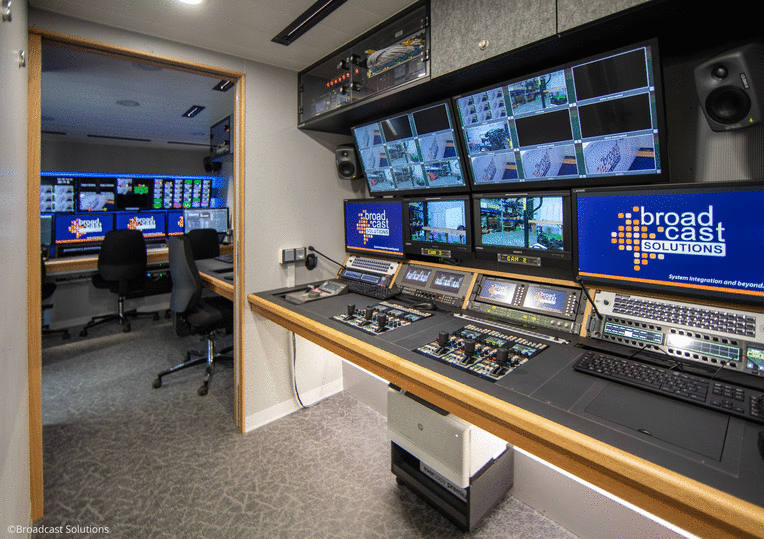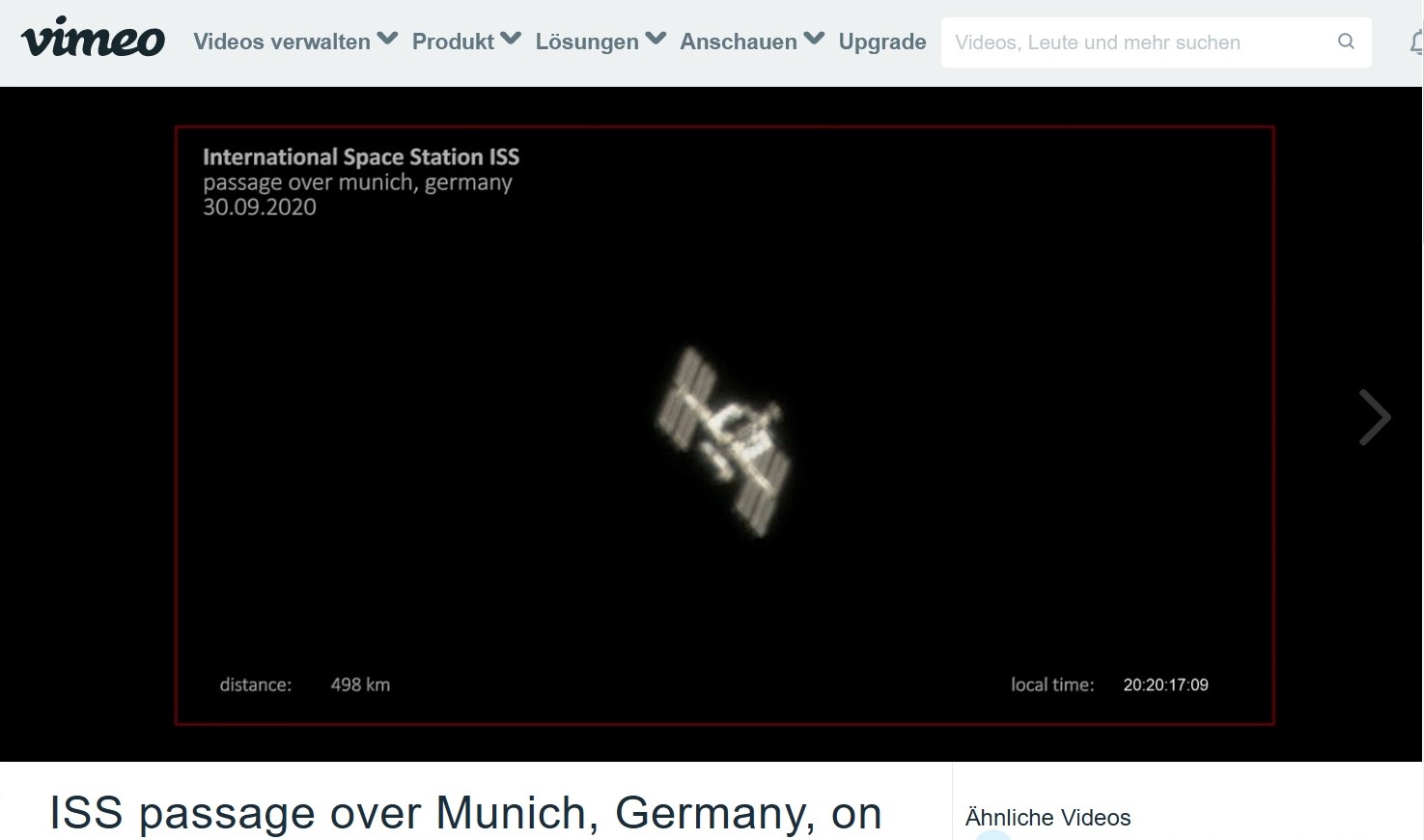Durch einen neuen Satellitentransponder können ab dem 3. März 2021 alle Sat-Zuschauer*innen ihre Lokalzeit in HD sehen. Durch die Umstellung soll sich die Bildqualität der elf Lokalzeit-Ausgaben deutlich verbessern – gerade auf großen Flachbildfernsehern. Um die neuen HD-Ausgaben zu empfangen, ist nur ein einfacher Sendersuchlauf nötig. Der kann ab dem 3. März entweder automatisch oder manuell erfolgen. Bei einem händischen Suchlauf müssen folgende Parameter eingegeben werden: Empfangsfrequenz: 11523,25 MHz; Polarisation: horizontal; Modulation: DVB-S2 8PSK; Symbolrate: 22 Msymb/s; FEC: 2/3
Die schon bestehenden HD-Angebote des WDR werden ab der Umstellung mit dem Hinweis „alt“ versehen. Sie werden zwar zunächst noch weiter ausgestrahlt, sollen aber irgendwann abgeschaltet werden. Deswegen empfiehlt es sich, die alten Programme zu löschen.
Quelle: wdr.de
Monat: Februar 2021
ISS-Teleskop-Video
ISS-Teleskop-Video:
https://vimeo.com/476651368
Wie die ARISS-Europe mitteilt, können sich bis 28. März Schulen und Jugendorganisationen für einen Live-Kontakt mit einem Mitglied der Besatzung auf der Internationalen Raumstation ISS bewerben. Dieser Kontakt ist dann für das 1. Halbjahr 2022 vorgesehen. Weitere Informationen zur Bewerbung sind auf der Internetseite von ARISS-Europe zu finden:
http://www.ariss-eu.org/school-contacts
An ARISS educational school contact is planned for Mike Hopkins KF5LJG, Victor Glover KI5BKC, or Shannon Walker KD5DXB with students at Sterling MS, Ashburn, VA, USA. The contact is scheduled on Tuesday February 9, 2021 at approximately 14:44 UTC, which is 15:44 CEWT.
The link to the ISS will be operated by the amateur radio telebridge station ON4ISS, located in Belgium. .Downlink signals will be audible in Europe on 145.800 MHz FM.
School Information:
Sterling Middle School in Loudoun County, Virginia, is a Title 1 school with an enrollment of 1,118 students. Our school has a high percentage of economically disadvantaged students, with 75% on free or reduced cost meals. Our diverse community population speaks 24 languages and 59% of our students are English learners. Our two participating elementary schools, Sterling Elementary and Guilford Elementary, have similar demographics.
This mission of Loudoun County Public Schools (LCPS) is „Empowering all students to make meaningful contributions to the world.“ We believe in providing deeper learning opportunities that challenge students through project and problem based learning and personalized learning. At STM, our mission is to be an exemplary learning community. The foundation of this community is built upon respect, meaningful relationships, relevant and engaging learning, and effective communication. It is our responsibility to create a culture of inclusion, equity, and excellence that engages students in activities that develop generosity of spirit and ignite student learning.
LCPS strives to empower all students with 21st century skills that demonstrate the 5 Cs: Critical Thinking, Communication, Collaboration, Citizenship, and Creativity in their learning process. Our educational objective is to provide our students with real world experiences and connections to classroom learning. Our students are exposed to STEM through multiple classes, including the Empowering Diversity in Gifted Education (EDGE) program, Coding, Robotics, History (Space Race), and of course Science and Math.
Specifically, 6th grade students learn about Astronomy and have been eagerly following various developments at NASA, including the Artemis Mission. Our students participated in the „Name the Rover“ public poll to name the next Mars Rover. Every year, students participate in a school-wide STEM day. This school year we participated in the medium altitude balloon launch sponsored by the Udvar-Hazy Smithsonian National Air and Space Museum. Our balloon tracked up the East Coast to Newfoundland.
STM students and staff are excited and thankful to ARISS for providing this unique opportunity to connect with astronauts on the ISS. We are thankful to our educational partners for their time and resources to prepare our students for this opportunity.
Students First Names and Questions:
1. Valentina (grade 6): What kind of training do you have to complete to become an astronaut?
2. Geovanny (grade 3): How do astronauts stay healthy in space?
3. Ariana (grade 4): What made you want to become an astronaut?
4. Aiden (grade 7): What is your daily routine like?
5. Muqadas (grade 8): Do the sun, stars, sunrises and sunsets look different from the ISS compared to Earth?
6. Ryan (kindergarten): How does your „ship“ get you back down to Earth?
7. Isabella (grade 5): What is the weirdest thing that has happened to you in space?
8. Annabelle (grade 6): How do you feel emotionally and physically while in the rocket on your way to the ISS and on your way back?
9. Kaylee (grade 7): What was your reaction when you found out you were chosen to go to the ISS?
10. Mariam (grade 8): When you return to Earth, how long does it take for you to be able to walk again? Do you experience any other side effects of being in zero gravity for extended time?
11. Geovanny (grade 3): asking for Dylan (grade 4) How do you eat and drink in space without spilling and damaging your equipment?
12. Ariana (grade 4) What do you like to do for fun in space?
13. Muqadas (grade 8) asking for Lilyana (grade 8): Are you able to bring your phones and other personal items with you to the ISS?
14. Aiden (grade 7) asking for Omar (grade 7): When you come back to Earth, what will be your first meal?
15. Valentina (grade 6) asking for Julia (grade 6): What do astronauts do if you fall sick in space?
16. Kaylee (grade 7) asking for Amaya: How does it feel to be inside the ISS all the time? Does the environment (temperature, humidity) inside the iSS fluctuate?
17. Mariam (grade 8) asking for Ashley (grade 8): If you weren´t an astronaut, what job would you have?
18. Anabelle (grade 6) asking for Zayn (grade 6): How does it feel to experience 16 sunrises and 16 sunsets every day?
19. Ryan (kindergarten) asking for George (grade 5): How do you train to be in low gravity places?
20. Isabella (grade 5): What do you eat while in space? What is your favorite food?
Gaston Bertels, ON4WF

